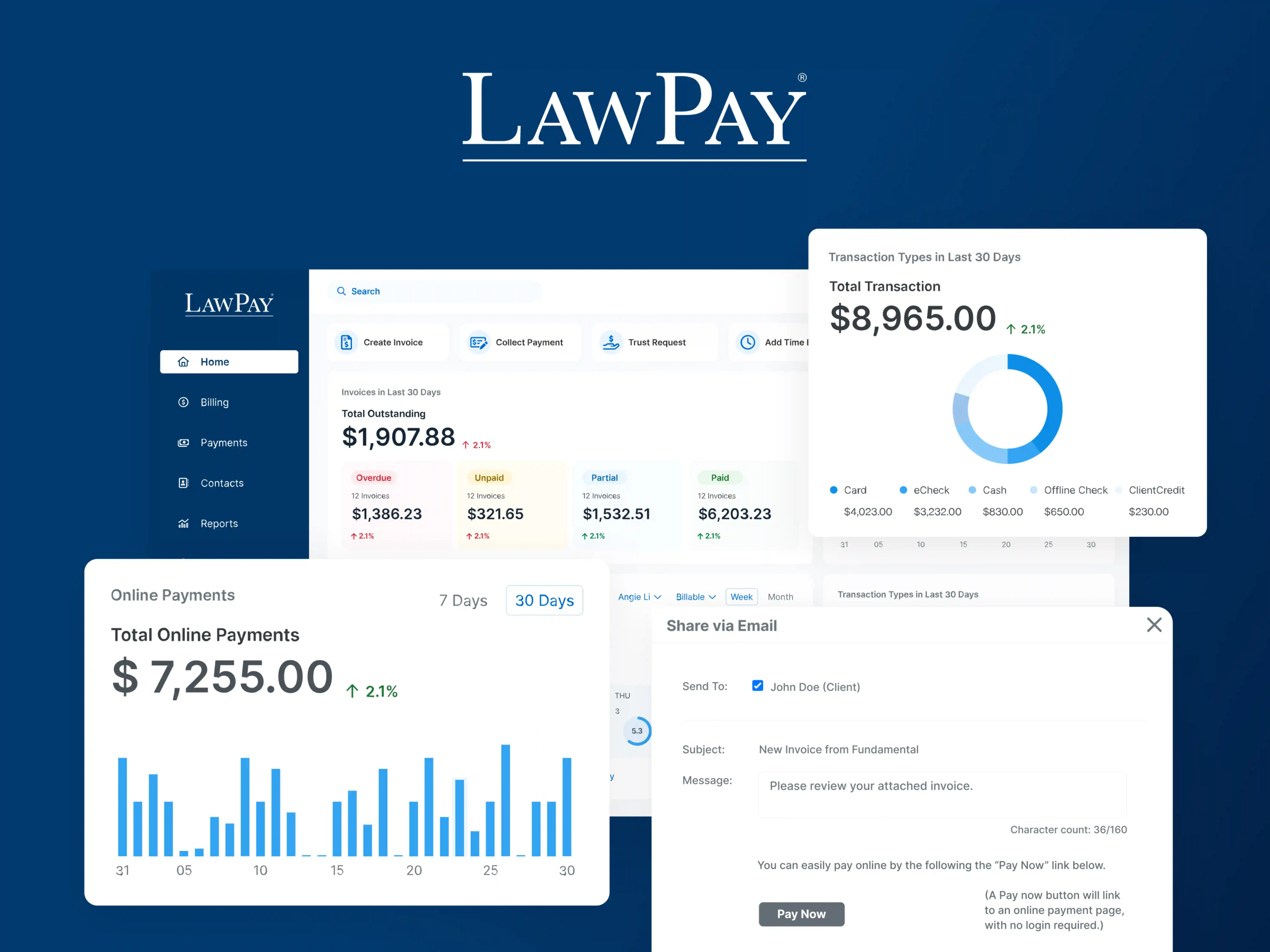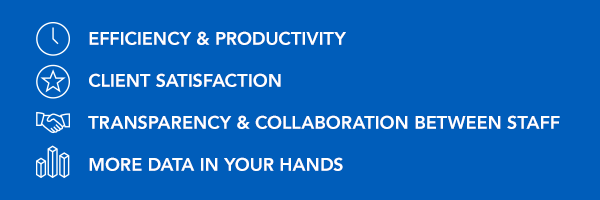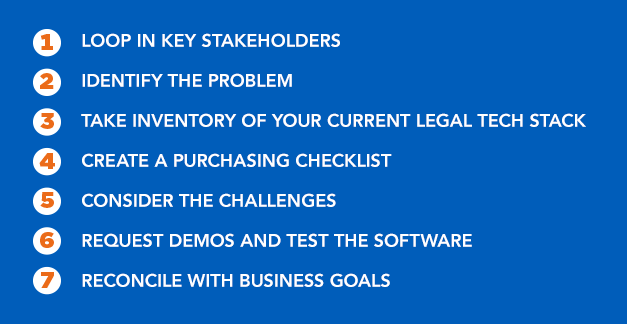Technology is one of the biggest drivers of change in the legal industry. It's made research and discovery easier, enabled e-filing, and streamlined attorney-client communication. Technology can be a game-changer for law offices of any size—as long as the firm invests in the right solutions.
Schedule a demo to see what LawPay can offer your firm.
Book Now
What is legal software?
Legal software refers to computer programs specifically designed to assist lawyers and other legal professionals in their practice. These programs can range from simple tools for managing case files and documents, to more complex systems that help with legal research and analysis. Some examples of legal software include case management software, legal billing and time tracking software, document assembly software, and legal research platforms.
Why does legal software benefit my firm?
Legal software can streamline and automate various tasks, helping legal professionals be more efficient and effective in their work. It can also help reduce the risk of mistakes and provide a more organized and efficient workflow for handling legal matters.

Efficiency & Productivity
By automating repetitive tasks and streamlining processes, legal technology can free up time for attorneys and staff to focus on more complex and high-value work. For example, contract analysis software can quickly and accurately review and analyze contracts, freeing up attorneys to focus on negotiations and strategy.
Additionally, legal project management tools can help attorneys and staff better organize and track their workload, allowing them to prioritize tasks and meet deadlines more efficiently.
Client satisfaction
With tools such as client portals and online document management systems, clients can easily access and track the progress of their cases. This can increase transparency and provide a sense of control for clients, as they can stay informed about their cases' status without constantly reaching out to their legal team.
Legal technology can also streamline the communication process between clients and their legal team, allowing faster responses and more efficient resolution of issues. Additionally, legal technology can increase the accuracy and speed of tasks, ultimately leading to faster resolution of cases and a more efficient legal process for clients.
Transparency and collaboration between staff
Legal technology has the potential to greatly increase transparency and collaboration within a law firm. With tools such as document management systems and project management software, staff can easily access and share relevant information with one another. These tools also allow for real-time communication and collaboration, as team members can easily communicate with each other through instant messaging or video conferencing.
This can improve the efficiency of tasks and projects, and foster a sense of transparency and open communication within the firm. Additionally, legal technology can allow for greater transparency in the decision-making process, as all team members can access and contribute to discussions and debates related to a case or project.
Overall, legal technology can lead to a more cohesive and collaborative work environment, ultimately benefiting the law firm and its clients.
More data in your hands
In an increasingly data-driven world, lawyers need to be able to use data to their advantage to provide the most effective representation and customer experience for their clients.
Legal technology can greatly enhance a law firm's ability to access and utilize data. With tools such as legal analytics software and artificial intelligence, law firms can quickly analyze large amounts of data and identify trends and patterns that may be useful in cases and projects. This can help attorneys and staff make more informed decisions and strategize more effectively.
Legal technology can also allow law firms to organize and store data more easily, making it quickly accessible to relevant team members. This can improve the efficiency of research and document review tasks, as team members can quickly access and use relevant data. Additionally, legal technology can help law firms more easily collect and analyze data from clients, allowing them to better understand their needs and preferences.
7 best types of software for lawyers
To ensure you're maximizing efficiency in your practice (and not sacrificing the quality of the client experience), consider these essential software categories for law firms.
Practice Management
Document and case management to timekeeping, billing, calendaring, email organization, and even payment processing - all from one application
Some practices prefer to use a law firm software solution that can do a little bit of everything. Practice management solutions, like MyCase, come with an impressive collection of features—from document and case management to timekeeping, billing, calendaring, email organization, and even payment processing—all from one application.
MyCase's best-in-class cloud-based system, now fully integrated with LawPay, allows for remote collaboration with clients and firm members, increasing productivity and client satisfaction, and decreasing the time spent on administrative tasks.
Timekeeping and Billing
Forming great billing habits isn't always easy. Thankfully, there is a type of law firm software that can help streamline this tedious task: timekeeping programs.
With a great attorney timekeeping solution, you can organize projects by client and run a stopwatch to track the time you've spent on each.
Some of the most popular solutions today are mobile apps, which allow busy lawyers to run their stopwatches from their phones or tablets.
Online Payment Processing
Your clients can easily pay invoices from their computer or mobile device using a credit card, debit card, or eCheck.
An online payment processing solution allows you to accommodate your clients' preferences and do so securely. Rather than being restricted to only in-person transactions or having to mail a paper check, your clients can easily pay invoices from their computer or mobile device using a credit card, debit card, or eCheck. All sensitive information is encrypted and transmitted directly between financial institutions, keeping it safe from being compromised.
Plus, when you partner with an online payment processor, all payment details are verified instantly. You'll be informed immediately if a bank account has insufficient funds, or an incorrect credit or debit card number is provided.
Using a payment processor built for the legal industry allows you to provide more modern methods of payment, like legal fee financing.
While there are plenty of generic payment platforms you could use, it's a much better idea to use an online payment solution designed with attorneys in mind—like LawPay. Because LawPay was developed specifically for lawyers, it not only prevents commingling of earned and unearned funds, but it also protects your trust account from any third-party debiting. It's the only payment solution that ensures ABA and IOLTA compliance for credit card, debit card, and eCheck transactions.
Additionally, using a payment processor built for the legal industry allows you to provide more modern methods of payment, like legal fee financing, while ensuring you don’t compromise on regulations and ethics. It’s a win-win!
Document Management
A legal document management program can store [case] files in a secure digital vault while providing handy organizational features.
With every case you take on, there will be numerous documents and files to support it. Storing sensitive data on your computer's hard drive for extended periods is not recommended. These documents could be compromised in a cybersecurity emergency, such as a data breach.
A legal document management program can store these files in a secure digital vault while providing handy organizational features. Many free file storage solutions are available, such as Google Drive, with premium options available that can increase your storage limit.
Other powerful and proven solutions popular in the legal industry include NetDocuments and Worldox. Many of these solutions are also cloud-based, allowing legal teams to access and collaborate on documents from wherever they are.
Productivity
Productivity tools are among the world's most widely used computer programs and an important part of any list of essential law firm software solutions. These include word processors, presentation programs, and spreadsheets, with the oldest and most famous of these solutions being Microsoft Office Suite.
Many businesses today have switched to cloud-based solutions, where creative teams can collaborate on documents in real-time from separate machines.
However, many businesses today have switched to cloud-based solutions, such as Google's G Suite, where creative teams can collaborate on documents in real-time from separate machines.
PDF Conversion
Not every document you receive in your day-to-day practice is digital. Some of your clients may have vital documents that predate the advent of personal computers or weren't created digitally.
With a PDF converter, you can use a scanner to scan a hard copy of a document and convert it into a digital file which can then be shared through email and cloud services.
It can even be searched like a word processing document with optical character recognition (OCR) technology.
The leading solution on the market is Adobe Acrobat, which has provided reliable PDF conversions for over 20 years. The latest version of Acrobat is only available through a subscription service, so more cost-conscious law firms looking for a powerful PDF conversion solution might find Icecream PDF Converter more appealing. It can be used with limited features for free, with a one-time premium cost to unlock the full version.
Password Management
Far too many professionals take too few precautions when it comes to protecting their accounts and passwords from cyber criminals.
With password management software, you have the freedom to create complex, hack-proof passwords that you could never remember on your own.
With password management software, you can keep your accounts secure by storing all of your passwords within a secure application, which you can use to readily recall your password when you need it. Since the app remembers your passwords for you, you have the freedom to create complex, hack-proof passwords that you could never remember on your own.
One of the most popular and powerful options for password managers is LastPass, a premium web browser extension and mobile app that is compatible with nearly every browser and operating system, respectively.
If you like the idea of an app securely storing your private data, you may find Dashlane appealing. Aside from passwords, it can also store billing addresses, credit card data, identification cards, and other personal information. Read a guide on some of the other best password managers over here.
How to choose and vet new legal software solutions

As a law firm, it is important to choose and vet new legal software solutions carefully in order to ensure that they meet your needs and goals. Here are some tips for choosing and vetting new legal software solutions:
Loop in key stakeholders: When purchasing new legal technology solutions, it is important to involve key stakeholders in the decision-making process. This includes individuals or teams who will be using the technology daily, as well as those who will be responsible for implementing and maintaining the technology. It is also important to involve leadership and decision-makers, as they will be responsible for approving the budget and ensuring that the technology aligns with the overall goals and strategy of the organization. Gathering input and feedback from these stakeholders will help to ensure that the technology meets the needs of the organization and that it is adopted successfully. It is also a good idea to seek input from subject matter experts and external consultants who may share relevant experience and insights.
Identify the problem: Before you start looking for new legal software solutions, it is important to identify your needs and goals. What tasks or processes are you looking to improve? What features are you looking for in a software solution? By clearly understanding your needs, you can narrow down your options and focus on solutions that are likely to meet your needs.
Take inventory of your current legal tech stack: Law firms can evaluate their current tech stacks by assessing the efficiency, effectiveness, and overall value of the technology they are currently using. This may involve conducting a formal audit or review of the technology, gathering input and feedback from team members who use the technology daily, and analyzing data on usage and adoption rates. It may also be helpful to compare the firm's tech stack to those of other firms in the industry to see how it stacks up in terms of functionality and cost. Law firms may want to consider specific factors when evaluating their tech stacks, including:
The degree to which the technology meets the firm's needs
The level of support and maintenance required
The potential for integration with other systems
If you are using other systems or software within your law firm, it is important to consider how well a new legal software solution will integrate with these systems. Look for solutions that can easily integrate with your existing systems to avoid any disruptions or complications.
Create a purchasing checklist: Knowing how to determine whether a potential legal tech solution is worth adopting can be the difference between investing in technology that drives the firm forward and losing money on software that causes more problems than it solves.
Not all law office technology is created equal. Here are some different criteria you may consider including on your "must-have" list:
Includes a legal-focused foundation and understands the distinct financial requirements of legal professionals like you
Vetted and recommended by your state bar association and the ABA
Features direct integrations with the other law firm software solutions you rely on to run your business
Provides access to customer support via phone, email, and chat
Provides valuable resources such as ebooks, guides, sample forms, and no-charge CLE webinars
Requires no set-up or cancellation fees or long-term contracts
Once you have identified your needs, it is time to start researching your options. We recommend looking for legal software solutions specifically designed for law firms and encourage you to consider various factors such as cost, user-friendliness, and integration with other systems.
Consider the challenges: Law firms should consider several aspects when choosing to purchase and implement a new tech solution. One challenge is ensuring that the new technology is compatible with the firm's existing systems and processes and will integrate seamlessly into its workflow. Another challenge is investing in training team members on using the new technology, and there may be a learning curve as team members become familiar with the new system. Firms should also consider the level of support and maintenance required for the technology and whether they have the resources to manage these tasks in-house or if they will need to rely on external vendors. In addition, legal tech solutions often involve handling sensitive client data, so firms must ensure that the technology is secure and compliant with relevant laws and regulations. Finally, firms should consider whether the technology can grow and adapt as the firm's needs evolve.
Request demos and test the software: Once you have identified your needs, it is time to start researching your options. Look for legal software solutions specifically designed for law firms and consider various factors such as cost, user-friendliness, and integration with other systems. Many legal software providers offer demos or free trial periods, which can be a great way to get a feel for the software and see how it will work in your law firm. Take advantage of these opportunities to try out the software and see if it fits your needs.
Before making a decision, read reviews and get references from other law firms using the software. This can give you valuable insights into the pros and cons of the software and help you make an informed decision.
Reconcile with business goals: Tracking the results of the new technology is also an important step in ensuring it serves your business goals. This can involve setting specific performance metrics and tracking the data over time to see if the technology is having the desired impact. It's important to be proactive in monitoring the results and making adjustments as needed to ensure that the technology meets your business goals. By regularly reviewing the data and making adjustments as needed, you can ensure that the technology positively impacts your law firm.
Schedule a demo to see what LawPay can offer your firm.
Book Now
LawPay: A software solution built specifically for the legal industry
Regardless of which law firm software solutions you choose, your practice will certainly benefit from taking advantage of the latest technology designed to help run your practice more efficiently. One of the most important ways to ensure your law firm is as profitable as possible is utilizing billing and payments software to streamline their billing process, improve cash flow, and reduce administrative burdens.
LawPay is a great technology solution for law firms to implement into their tech stack because it streamlines the billing process and helps to improve cash flow. With LawPay, attorneys can easily create and send invoices to clients, track payment status, and accept online payments. This can help to reduce the time and effort spent on billing and collections, freeing up attorneys to focus on other important tasks. Additionally, LawPay offers a secure and compliant platform for processing payments, which is essential for law firms handling sensitive financial information.

For more tips and tricks on how to start goals, market your firm, streamline workflow, and increase profitability, check out our eBook, The Legal Professional’s Guide to Your Best Year Ever. To learn more about how LawPay can help your firm grow, we invite you to schedule a demo!
About the author

Hannah DeFreitasSenior Content Writer
Hannah DeFreitas is a Senior Content Writer for leading legal software brands, including MyCase, Docketwise, CASEpeer, and LawPay—the #1 legal payment processor. She distills industry trends and data into strategic insights that empower legal professionals to streamline workflows, increase revenue, and gain a competitive edge.
